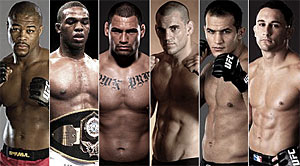
BJ Penn and Randy Couture
Now that we have a definition, it’s time to put it into practice. The two prime examples of the confusion between what is great and greatest are BJ Penn and Randy Couture.
For many, this statement will need an explanation. If you class fighters into three categories, that is: good, great and greatest, leaving the average fighter and those below unmentioned, both Couture and Penn reach the second stage not the first.
Yes, both have held UFC titles in two different weight classes (Penn, lightweight & welterweight; Couture, heavyweight & light heavyweight) which no other fighter (including the greatest fighters that will be mentioned later) has accomplished, but still they do not reach the zenith of the sport.
If you are to be considered one of the greatest then there is no excuse for losing on a consistent basis. If you are one of the greatest you dominate your sport. You face the best of your era and you rarely lose. Both Penn and Couture have not accomplished this task. Have they won? Yes. Have they won in the most important fights? Yes. But they have lost almost as consistently in these fights. Everyone will bring up a myriad of reasons for this, but they still lost, and losing and greatness are never comfortable bedfellows.
I understand the Couture lost to bigger opponents in the heavyweight division, motivating him to lower his weight to fight in the more comfortable light heavyweight division. I also understand the man was always fighting younger men. But for every Vitor Belfort he beat, there was a Vitor Belfort he got beaten by. Couture won a UFC title five times which seems remarkable until you realize in order to do this, he must have lost it also. The greatest fighters rarely win titles multiple times because once they gain a title, they rarely give it up.
When Penn beat Matt Hughes at UFC 46 to win the welterweight title it was a “greatest” moment. Penn is one of those rare fighters who transcends a definite weight class. Although most state he is a natural lightweight it’s more truthful to say he is a cusp fighter. That is, a fighter who is naturally on the cusp between two weight classes. When fighting in the lightweight division he is usually larger than his opponents, when fighting in the welterweight division he usually looks smaller. Winning titles in both divisions proves he is great. But losing almost as much in both weight classes proves he is not the greatest.
Just as Penn is a cusp fighter, his career became a cusp to greatness when he faced Frankie Edgar. Unlike Couture, when “The Natural” faced Lyoto Machida at UFC 129 and showed he was fully passed his prime, Penn, when facing Edgar at UFC 112 & 118, was in his prime fighting years. He lost both fights.
For those commentators who mentioned Penn’s losses at welterweight (Hughes and St-Pierre being the ones mentioned) as a man fighting above his natural weight class, they have no reason to mitigate the two losses to Edgar.
If we look at Penn’s fights at welterweight, those commentators stating that he is fighting above his natural weight class seem to be making excuses when we examine the contests more closely. Penn has had enough success at welterweight to dispel any reasons to consider him a man out of water. Penn has beaten Matt Hughes twice and fought to a draw with Jon Fitch, hardly a record for a man fighting above his abilities.
Although it is true that Penn has had much more success fighting at lightweight, it does not excuse his less than spectacular success at welterweight. When considering a fighter’s greatness the knife cuts both ways. If Penn had the same success at welterweight as he did at lightweight, it would be easily argued that he belongs in the “greatest” category; That is before Frankie Edgar anyway.
Now that we have dispelled the Couture and Penn mystique when considering the difference between great and greatest, it’s time to give three examples of the latter and easily show why these three fighters are above the Couture’s and Penn’s of the fight world.
The traits that define the greatest fighters of all time are that they face the best and beat them consistently time after time. They eventually win the title, and defend it just as well as they did before they gained it. They need not be perfect, they just have to win, gain their title, defend it consistently, face all comers and in doing so rarely lose. If a fighter wins consistently but avoids the best the fight world has to offer they can not be considered one of the greatest. If a fighter gains the title but then avoids the best contenders in order to keep it, then again, they can not be considered one of the greatest.
Who are considered MMA’s greatest fighters on the next jump…





Stay Connected